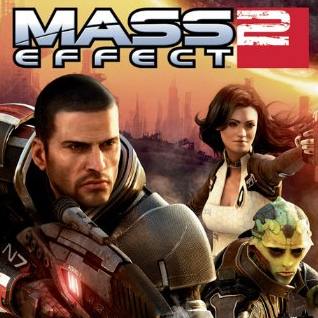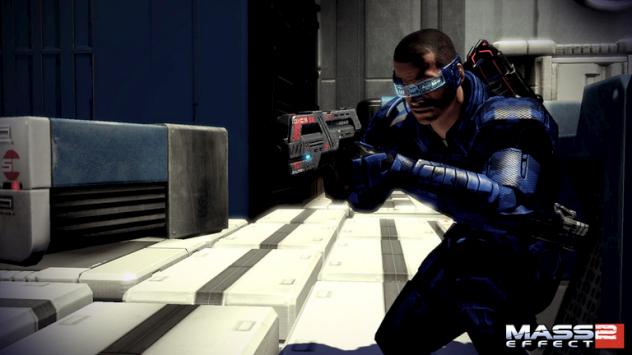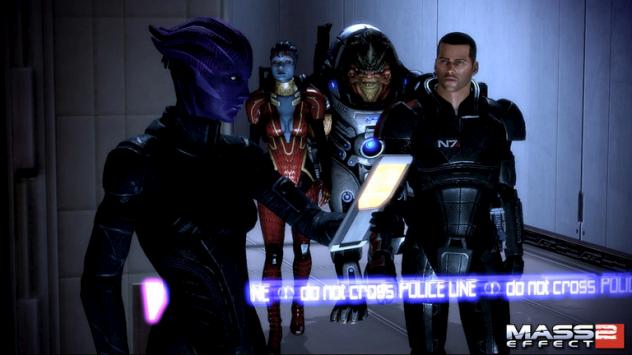
For the past 12 months, PS3 owners have had a huge gap in their gaming collection that XBox owners have been enjoying and waxing lyrical about. A game with such magnitude and variety that it was apparently enough for many people to buy a 360 just for that game. But now the wishes of the PS3 world have been finally answered: Mass Effect 2 has arrived.
It’s well documented that the original Mass Effect is an important step in the storyline, introducing the player into the game’s universe and politics. But without the original game on the PS3, most people playing this version will have missed out on all of that. For that very reason, this review comes from the perspective of a PS3 owner who never played the original Mass Effect. There will be no comparison to the original, no comparison to the XBox 360 version of Mass Effect 2, and any confusions left by the lack of prequel will come across totally.
Strap yourself in, it’s going to be quite a ride.
For some time now I’ve wondered what all the fuss was about with Mass Effect 2. A galaxy to explore, a conversational element which affects your journey and some 3rd person adventuring and shooting. The ingredients by themselves don’t sound all that groundbreaking, but having spent a few weeks with the game trying out different journeys and ideas it soon became clear that Mass Effect 2 is unlike anything seen before on the PS3. Sure, SEGA did a reasonable job of conversational consequences and quest freedom with Alpha Protocol, but that’s a drop in the ocean by comparison.
Your journey begins with an exciting attack scene, forcing your first few decisions and culminating in a shocking but tantalising outcome. Having chosen a few character customisations (which will also alter how you play the game) everything kicks off. If you’ve redeemed the Cerberus code inside the box you’ll get an interactive comic compressing the details of the first Mass Effect game into a beautifully created visual story, which lets you make a few decisions that would normally have been left as a default set of assumptions. It’s a great idea, but first time round you won’t really know who’s who, and it’s only after your first play-through that the comic makes total sense, more so considering you need to decide who you left to die on a previous mission without fully understanding who the people involved are. But either way, it’s a nice way to summarise previous goings on and without it the opening few hours would certainly make less sense.

From here on you’re under total control of how the story pans out. You can choose to do missions in any order, which in the early stages means visiting various parts of the universe to find, rescue or investigate various people to join your team (although “people” is a loose term, you’ll encounter a range of races). Each mission allows you to choose 2 other team members to join you, so the more guys you have available the more likely you are to succeed. Each member also has their own attributes and special abilities, which will need to be combined to suit the mission you’re about to undertake. Luckily, you have a couple of team-mates to start you off, so apart from the very first few moments of the game and a few other isolated sections you’ll never be totally alone. These squad mechanics give you even more to think about during combat through being able to give the others instructions such as where to take cover, which weapon to use or which special power to unleash on the enemies. Enemies which, incidentally, vary massively through the game from fairly tame security robots through to highly armoured rival humans and massive war machines. Each needs a different approach, and your choice of weapons and powers will be the key to your success at each mission.
Your missions are spread out across a huge universe, allowing you to travel to a bewildering number of separate solar systems and explore many of the planets in each one. Planets that don’t offer the opportunity to land and explore give you the chance to scan the surface for resources and send a mining probe where you find a good source – these materials form the basis of weapon and ship upgrades so hunting round for planets rich in, for example, platinum forms its own mini game which is enough to keep you mesmerised for a few hours by itself. When you get to land on a planet the environments are never quite the same. You’ll find planets rich in life and sporting forests, waterfalls and cattle wandering around, then moments later travel to an uninhabitable mass of fire and volcanoes. Each and every planet looks amazing and stretches a huge amount into the distance, and even looking at the sky presents you with menacing looking clouds, gorgeous starry skies or enormous moons above you. You’ll be hard pushed to find a part of the game which doesn’t look incredible, and when you consider just how much there is to see it’s most impressive that the only issues you’ll find are a few very occasional rough textures on the ground while you’re flying round a planet’s surface.
Similarly, taking a step inside a building or around your ship everything is crisp, brilliantly designed and looks spot on. Damaged buildings crumble around you, explosions and flickering lights cast great shadows across the walls and floor and enemies and other characters look and move naturally. And despite an incredible amount of voice work in the game, conversations flow naturally and apart from very rare occasions you wouldn’t know from listening that the player was deciding how the conversation panned out. A good job really, considering you can have hours of conversations without even leaving your ship. Everyone on the new Normandy ship can be spoken to in some form, and doing so will sometimes give you new quests to carry out alongside the main storyline. These are easy to miss, but makes you all the more determined to keep a check on your crew frequently to make sure they’re all happy and good morale is maintained.

As you would expect, whether you choose to be a nice loving captain or a bit of a bitch will affect people’s opinions of you and alter the options available in some conversations. If you’re being a nice guy and treating people well you’ll be given some slightly more diplomatic ways of getting people to see things your way, and indeed the opposite applies if you decide to be slightly more aggressive with your approach. It’s certainly easier to play through the game using your own personality – being horrible to people consistently is tricky if you’re a nice person in real life, even in a game – but you’ll want to experience the game from both sides. Considering you’ll comfortably get 20 or 30 hours out of a single play through (even more if you want to be thorough) running through a few more times to try out the different classes and attitudes will keep you going for a considerable amount of time.
And what makes this time scale all the more impressive is that you won’t even get bored of the combat, something that in other games can start to feel a bit samey. Ducking in and out of cover, ordering your team around, picking off headshots from distance, it all feels brilliant. Attacks from enemies are a little signposted much of the time, and you can guarantee that if you enter an area with a few walls and boxes you’ll soon be accompanied by a group trying to shoot your lights out. But you know what? It doesn’t matter. As you sprint towards cover and glide gracefully into a crouch behind one of these handy walls you forget that they’ve clearly been placed there for the sake of the combat. Your enemies will use the cover intelligently too, and a while into the game when more powerful enemies start vaulting over the cover and charging at you all guns blazing, things get even more tense.
There’s even more I could write about if I felt it was necessary, in fact I could write all day about what Mass Effect 2 has to offer, but I don’t think that’s what you need to see here. What you need to know is that Mass Effect 2 is finally on the PS3 and it deserves every ounce of the obsession that 360 owners have devoted to it over the last 12 months. I was determined not to get caught up in the hype, not to go along with the crowd and shout about Mass Effect 2 being one of the finest games of this generation of consoles just because everyone else thinks so. But the truth can’t be avoided – Mass Effect 2 is one of the best games I’ve ever played. The diversity, considerations and craftsmanship that has gone into building a game that grabs you firmly by the face and doesn’t let go can’t be underestimated. I think about my crew every day, even when not playing. I consider my future options, deciding who to help first, or which team members to recruit next. I mentally weigh up the options I have for upgrading my kit, and try to work out which of my crew would be able to utilise them the most. It’s all too easy to let it become a part of your life.
And when you get this absorbed into a game, you know you’re witnessing a work of art.


Nice write-up – only got it myself on Saturday and just done the mission that was the 2nd half of the demo – recruiting the alien doctor chap. Really enjoying it.
Thought I was missing something with the interactive comic, they didn’t do a very good job at all of giving you enough info on the decisions. Who lives, A or B? I don’t know, you only introduced them in the previous sentence!
One other thing that’s bugging me – I’m trying to play as Paragon, but after years of QTEs in games, it is SO hard not to hit R2 when a Renegade option flashes up on a cut-scene. I accidentally killed someone last night because of my itchy trigger finger – I wasn’t happy about that!
I know what you mean about R2, it also took me a while to remember I could take my time picking a speech option too… after the time-limited choices on Alpha Protocol (the last game of this ilk I played) I’ve been rushing my choices a bit!